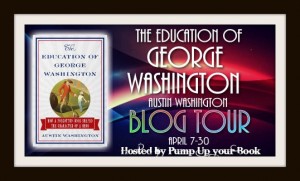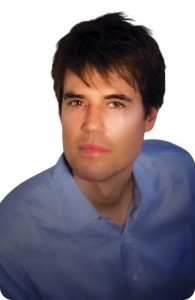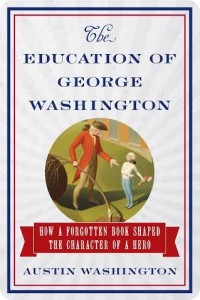Guest post by author Austin Washington
Actually, even before the parts of his life most people have at least heard of, George Washington became known as the best dancer in Virginia. Becoming great was a life long process. It’s interesting, by the way, once you learn a bit about Virginia at that time, why being a good dancer was important there. Also, George was known as a great athlete, he was admired by women – basically, he was a star, long before he became a legend.
George Washington’s guide to greatness has been called a “groundbreaking new discovery”, that had been unknown by all previous biographers. George Washington got, when he was fifteen, a kind of proto Tony Robbins book, with a huge difference. The modern self help movement, the apotheosis of which, I’d say, is the almost unreadable book The Secret – unreadable simply because it is so poorly written – has a philosophy underlying it that has some truth to it. But that doesn’t make it good or right.
In essence, stripped bare, that philosophy says something like, “I saw a red Ferrari on TV, and wow, do I want one. If I wish and hope and pray, by God, I’ll get one. Maybe I’ll have to work a little, too.”
George Washington’s guide to greatness flips this on its head. The idea is, if I listen to the voice of Providence, while simultaneously learning how the knowledge of what is good and great has been refined and distilled by our greatest civilisations, and if I internalise this, I might be onto something.
It’s not about greed, or materialism, but self sacrifice. The ultimate result, if you really “get it”, is you become not just good, but great. Greatness has its own rewards, which, coincidentally, often have a material component.
But you don’t end up like Donald Trump. You end up like, well, like George Washington. I mean, even only at the surface, at material things, look at Mount Vernon itself. It’s dignified, not gaudy. This is a reflection of something underlying, and deeper.
I spent three years, and three drafts, distilling this wisdom, then soaking the adventure of George Washington’s life in it, so that you almost subliminally gain and understand what George Washington gained and understood, while being taken on the journey of his life.
Ultimately, The Education of George Washington is probably not for you. But it might be. It all depends. Would you prefer a red Ferrari, or, on the other hand, the material rewards you’ll get if you become great. (Material rewards are beside the point. It’s what you become that matters. The rest is just icing on the cake.)
Although, perhaps this is an unrealistic goal for a book. One of the first reviewers called it “The best book ever written about the Father of Our Country,” then wrote me a personal note saying his review “did not do the book justice”. Well, even if my illusions about The Education of George Washington actually changing lives are wishful thinking , being “the best” in at least one reviewer’s opinion isn’t bad, I suppose.
Still, without a father, with very little formal education, starting out relatively poor, George Washington turned himself into “George Washington” with little but a book as a guide (which is included, in full, at the end of my book, by the way.) I do know that I have actually changed because of what I learned, through writing it. Although, come to think of it, I’m not President yet. But I am a good dancer.
Well, there’s time. What about you?
About the Author, Austin Washington
Austin Washington is the great-nephew of George Washington. He earned his masters and did post-graduate research focusing on colonial American history, and is a writer, musician, entrepreneur and global traveler. He returns to an old Virginia family home whenever he can. Austin’s first book takes a common criticism of his academic writing – “You’re not writing a newspaper editorial, you know!” – and turns it into a virtue, taking a subject dry and dusty in other’s hands and giving it life. He has lived abroad much of his life, most recently in Russia, and visits friends from Sicily to Turkey to Bangladesh and beyond. His earliest influences as a writer were Saki, Salinger, and St. Exupery, although in more recent years he has got beyond the S’s. As for historians, he is partial to the iconoclast Gibbon, who wrote history to change the future.
Learn more about Austin
About the book, The Education of George Washington
In Austin Washington’s new book, The Education of George Washington, readers will learn all about President Washington’s true model of conduct, honor, and leadership, including the actual historic document that President Washington used to transform his life from a poorly educated child of a widowed mother, to the historic, curious, highly influential and awe inspiring figure he became and remains today.
Read and Discuss The Education of George Washington
Amazon | Barnes & Noble | Discuss at Goodreads
Read an Excerpt from The Education of George Washington
“I Cannot Tell a Lie”— the Cherry Tree Story Is True (but Different from How You Heard It)
“What shall I say of the Nobleness of his Mind; and of that Character of Honor, Truth and Justice, which was so Natural to him . . . incapable of the Dissimulation, and other sordid Arts of Court. He could not promise what he did not intend to perform.” —H. de Luzancy, A Panegyrick to the Memory of His Grace Frederick, Late Duke of Schonberg
Parson Weems was married to the wife of a cousin of George Wash- ington’s close friend, Dr. James Craik. Parson Weems knew George Washington. Parson Weems preached at George Washington’s church. So why all the hating? The tale of George Washington and the cherry tree has been mistold for two hundred years—and thus mistakenly criticized, as people have been criticizing a story that Parson Weems never told. Still, despite all the debunking, the story of George Washington and the cherry tree is almost as iconic in America as Santa Claus and his elves. It therefore seems worthwhile to spend a little time explaining how we can say with certainty that yes, Virginia, the story of George and the cherry tree is true (but no, it’s not the story you’ve heard).
For those non-Americans out there, the story, in essence, is this: George Washington, when he was a small child, chopped down a cherry tree with a hatchet. When confronted by his father, he confessed, “I can- not tell a lie. I did it with my little hatchet.”
That’s the story. (Not much of a story, is it? But the story of the story could change your life.)
No one in America believes it any more. We’ve all been told ad nauseam that the whole story is a pious fable—a confabulation invented by Parson Weems.
What’s wrong with the story? Why can’t we trust Parson Weems?
We obviously can’t trust him because he admired George Washing- ton. No, honestly, that’s a big part of the argument. Parson Weems is a fanboy and therefore can’t be trusted. The generally accepted idea, expressed by Wikipedia, is this: “Weems also called Washington the ‘greatest man that ever lived.’ This degree of adulation, combined with the circumstance that his anecdotes cannot be independently verified, demonstrates clearly that they are confabulations and parables.”
But wait just a minute.
1. I’d always thought ad hominem attacks were a logical fallacy.
2. If something that cannot be independently verified is, ipso facto, not true, then all trees falling in all forests are always silent. That’s just silly.
3. Actually, the story can be independently verified. Beyond that, it passes the sniff test. Pretty clearly.



